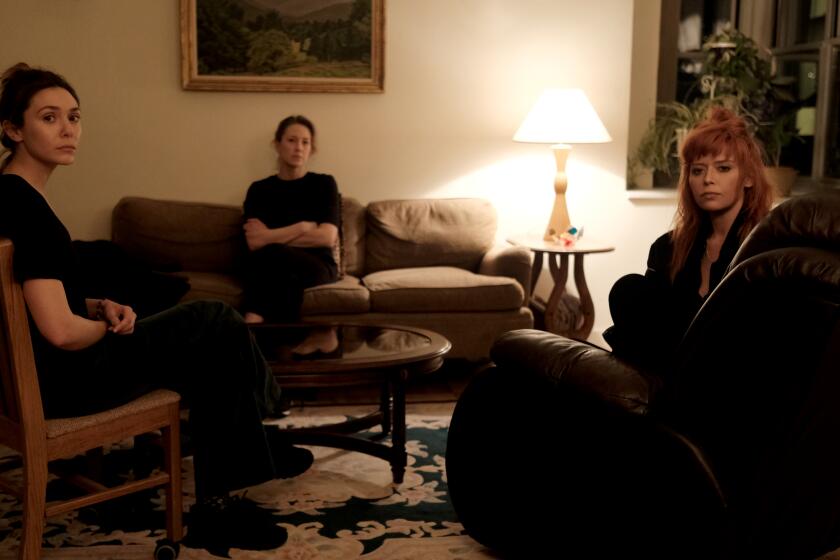
- Share via
“So, you’ve been good, right?” It’s the first line in “His Three Daughters,” the first line I wrote, and what we began with on Day 1 of filming. It is delivered by Carrie Coon, who I had in mind while writing for Katie, one of three sisters the story revolves around. Katie doesn’t wait for an answer, launching into a page-and-a-half diatribe against her sibling. I pictured starting with this sister against a white wall, giving us no sense of placement, with no opening credits. I wanted it to feel surprising, like when death arrives, no matter how expected it may be.
I was 19 when I first lost someone close, and one reaction was of extreme anger at movies. I felt completely lied to. There was no rewind, no slow motion, no music. This person had just gone. What’s more, the pain didn’t so much go away as it became something to live with, shifting as the absence became ever more concrete. This stayed in my thoughts as I sat down to explore my experience of loss on the page. I wanted some way to admit the shortcoming of the medium but also embrace the fantasy I so desired. A future without my parents was something I could not control, but in film, I could.
The latest film from Azazel Jacobs brings together Carrie Coon, Natasha Lyonne and Elizabeth Olsen for a deeply moving drama about family, grief and letting go.
Katie’s opening monologue spilled out and set me free. I had long created characters who kept their thoughts and grievances to themselves, only for those emotions to bubble up in ways they couldn’t articulate. With Katie, it was all being expressed. Questions followed: Who is this tirade aimed at? What happened to get here? They were destination points I wanted to explore.

I had a specific rhythm in mind, and the directness of Katie’s words was followed by something a bit sing-song. Christina is played by Elizabeth Olsen, whom I also wrote for in the hope she would come on board. Picturing her forced me to dig deeper, confident that she could find the balance between the humor and the pain if I could speak to it. In the opening, Christina says she came from afar, still jet-lagged, which she blames for her current emotional state. But to me, it also hinted to someone possibly in touch with her feelings. Who may have become self-reliant in a way her siblings had not.
I was embracing theatrics in life, the characters we cast ourselves as, especially with family. Role-playing is something I witnessed in these end-of-life moments, even in myself. I have become very different people, sometimes within the same day. This internal war between wanting to regress and disappear, to try to gain control or just make peace and be present, could become a dramatic conflict if each instinct was embodied by a different person.
Sitting opposite Katie at the start, and being the opposite of her, is Rachel, embodied by Natasha Lyonne. Yes, I wrote for her too. I also wrote for Jovan Adepo, who plays Rachel’s boyfriend, Benjy. This whole film was an exercise in believing that sometimes hopes can come true.
Rachel is somewhat based on a person I’ve been connected with since stroller days, and whose family was an extension of my own growing up. Yet, we’ve had very different lives. With Rachel, I was able to play with assumptions. Picturing Natasha allowed me to play initially with a character type we may expect from her. The challenge and fun came in deciding how and when to subvert this judgment.
Elizabeth Olsen, Carrie Coon and Natasha Lyonne unleash a whirlwind of dysfunction and passive aggression as sisters awaiting bad news about their ailing dad.
These three different sisters are gathering for the same reason: Their father is going to pass. It is unclear exactly when, but the time is near and it is absolute. If all goes “well,” he will die in the comfort of his home rather than a hospital, surrounded by his family. The title “His Three Daughters” is meant as both a question and an answer. They may not see each other as equals, but their father does.
Between the first loss of a loved one when I was 19 and now, there have been quite a lot of others, but today it feels everywhere. Most similarly aged friends have either lost or are losing their parents. I get that outliving parents is the best-case scenario, but nothing feels natural about it. For me, it’s been painful and confusing. The experience of making “His Three Daughters” has been the opposite.
The script gave me the ability to say how and when. To feel hope along with the fear. Having these actors show up on Day 1, not only off-book with every line but — understanding the specific tempo I had in mind — with every bit of punctuation memorized, felt like my hand was being held, and the response to Katie’s, “So you’ve been good, right?” was, “Hey, we got you.”
More to Read
From the Oscars to the Emmys.
Get the Envelope newsletter for exclusive awards season coverage, behind-the-scenes stories from the Envelope podcast and columnist Glenn Whipp’s must-read analysis.
You may occasionally receive promotional content from the Los Angeles Times.










